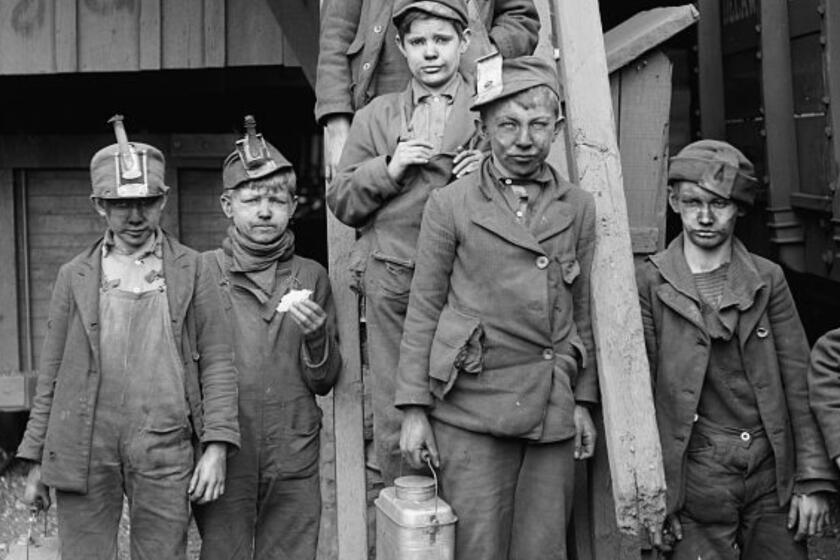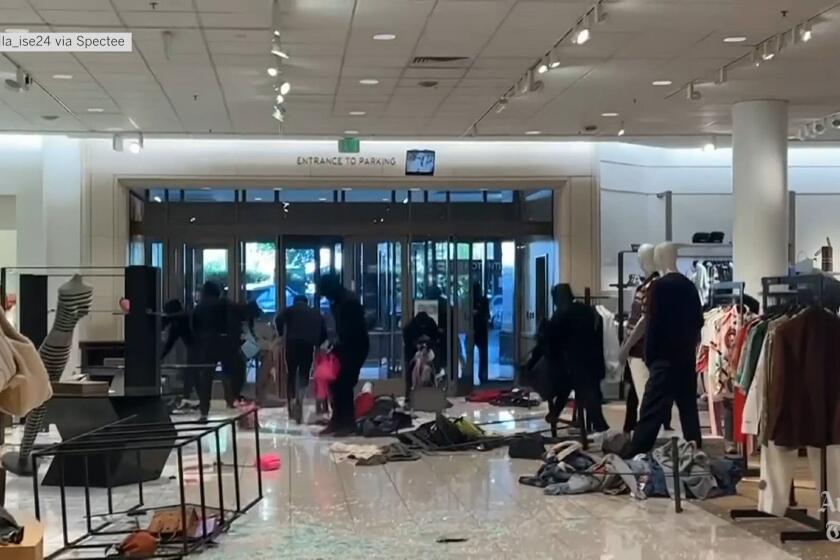How chicken processed using child labor ended up at your favorite supermarket

- Share via
When the investigators came, operators of a Southern California poultry processor allegedly hid child workers in bathrooms and closets and hurried them out the back door, according to a U.S. Department of Labor lawsuit.
In two poultry plants in La Puente and City of Industry owned by Tony Bran, federal authorities alleged, kids as young as 14 were illegally working dangerous jobs, deboning chicken and operating heavy machinery. Eventually, the chicken ended up at major supermarkets and distributors like Ralphs, Aldi, Grocery Outlet and Sysco, officials said.
Subscribers get early access to this story
We’re offering L.A. Times subscribers first access to our best journalism. Thank you for your support.
The workers came primarily from Indigenous communities in Guatemala and spoke Q’eqchi’, K’iche’ and Mam. Instead of going to school, the child laborers worked so many hours they were owed overtime pay. Children worked long hours alongside adults, and Bran was allegedly cheating them all out of wages, the federal lawsuit said.
After the investigators left Bran’s Los Angeles-area plants, the workers told authorities, he corralled them.
“[He] told us that he doesn’t care about us, we mean nothing to him and that we should leave if we do not like how he is paying us or treating us,” one worker said in a translated court filing related to the Department of Labor lawsuit.
Grocery supplier Exclusive Poultry must pay nearly $3.8 million after an investigation found it employed children as young as 14 in dangerous jobs, the agency said.
Last month, Bran settled with the federal government and agreed to pay nearly $3.8 million to workers. Earlier this year, he settled a separate wage-theft lawsuit with the California Labor Commissioner’s Office, agreeing to pay $1.47 million in unpaid wages and penalties. The fines follow a Sept. 28 search by agents from the Labor Department who were accompanied by the U.S. Marshals Service.
Bran did not respond to an interview request or detailed questions about either case.
In court filings, he has denied all allegations against him.
“The Exclusive Poultry maintained business relationships with various companies to provide labor services,” Bran’s attorney, Anthony K. McClaren, said in a statement. “It was unaware of the Department of Labor allegations during the times they were alleged to have occurred.”
The Department of Labor said that Bran set up “front companies” — Meza Poultry, Valtierra Poultry, Sullon Poultry and Nollus’s Poultry — to employ workers. As part of a consent judgment, Bran and his company, the Exclusive Poultry, admitted they employed all of the workers at the poultry plants. Meza, Valtierra, Sullon, Nollus and their listed owners admitted to violations of labor law in separate judgments, but Bran has not acknowledged any such violations.
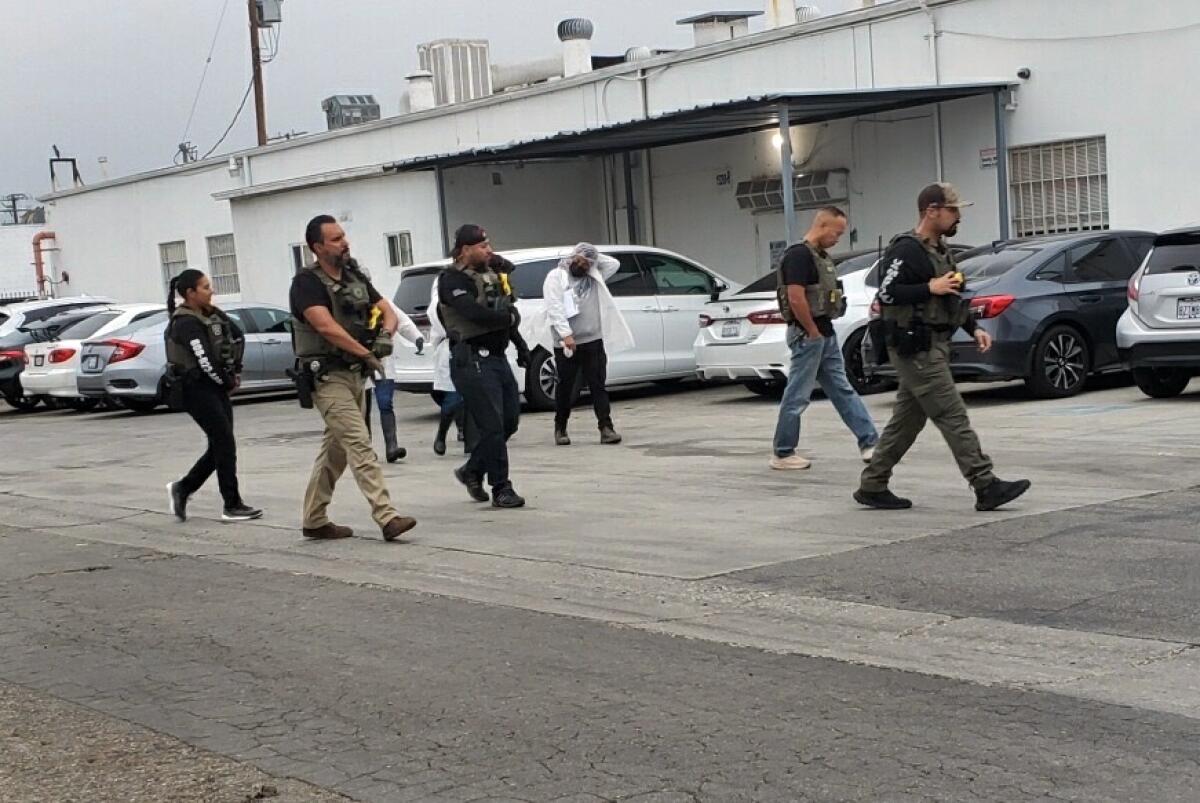
The conditions at the plants, and the use of child labor for products sold at major shopping chains in the heart of Southern California, generated headlines. But community advocates and experts said they were not surprised by the labor abuses, noting it points to widespread problems. Child labor, along with wage theft and retaliation, have long been the realities faced by many vulnerable workers, particularly immigrants.
“For us, this is not a new thing,” said Odilia Romero, co-founder of Comunidades Indígenas en Liderazgo, or CIELO, which helps migrant Indigenous communities in Los Angeles. “Within L.A. city, in the restaurant industry and the garment industry and construction industry, there’s kids working.”
Armando Gudino, executive director of the Los Angeles Worker Center Network, called L.A. “the wage-theft capital of the nation.”
More than half the Latino workers in Los Angeles get paid less than minimum wage, a report published earlier this year by the Los Angeles Worker Center Network found.
“Child labor is going to be the attention-grabbing issue, but the truth is that wage theft, retaliation and all kinds of labor abuses are prevalent in the entire immigrant population,” said Yunuen Trujillo, worker rights and labor legal services managing attorney at the Coalition for Humane Immigrant Rights.
Violations of child labor laws are on the rise in the U.S., according to a report earlier this year by the Economic Policy Institute. The number of minors employed in violation of child labor laws increased 37% in the last year, the report found, with a 283% increase since 2015.
“We’ve seen a lot more of it in the last two years,” said Victor Narro, a UCLA professor of labor studies. “The laws to protect workers are very weak, and then you throw children into it.”
The moral scourge of child labor was supposedly eradicated in America more than 100 years ago. Red states are bringing it back in the name of parental rights.
Nationally, industry groups are working to roll back child labor protections via state legislation, according to the Economic Policy Institute report. The main proponents are business groups and their state affiliates, particularly the National Federation of Independent Business, the Chamber of Commerce and the National Restaurant Assn., the report found.
A number of these bills have become law. For example, in Iowa, children as young as 16 are allowed to work in occupations such as roofing and demolition, and teens can work six-hour nightly shifts during the school year.
In the pre-dawn hours of Sept. 28, the Department of Labor executed search warrants at Bran’s poultry plants, accompanied by agents from the U.S. Marshals Service, who helped ensure the investigators’ safety. The federal agency was joined by a large team from government organizations and community groups, which sprang into action to provide services for workers. L.A. County chartered buses to transport employees to a recreation center that served as a staging area.
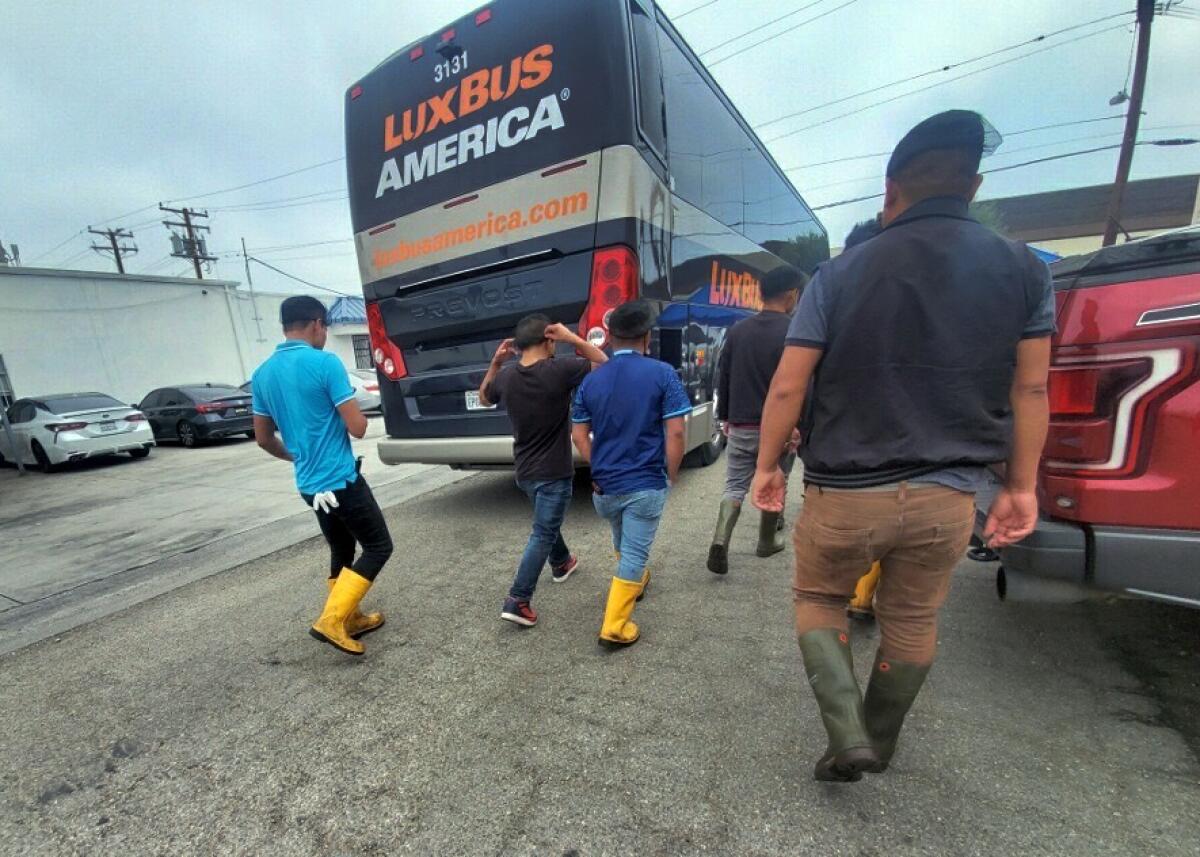
“We’ve done a lot of these take-down operations,” said Chanchanit “Chancee” Martorell, executive director of the Thai Community Development Center, which partnered with Los Angeles County Supervisor Hilda Solis’ office and the Los Angeles County Office of Immigrant Affairs. For decades, Martorell’s organization has helped provide social services to vulnerable workers in and outside the Thai community, often partnering with local and federal agencies.
Attorneys from the Thai Community Development Center helped screen the employees, provided legal services and worked to determine whether immigration relief was warranted.
Some of the workers were already subject to deportation proceedings, Martorell said, noting there were about 200 workers at Bran’s poultry factories, most of whom appeared to be undocumented. Some of the children were unaccompanied minors, and some came here to join family, she said.
CIELO staffers provided interpretation in each worker’s Indigenous language.
“One of the things that I really noticed was that there was a distrust there,” said Aurora Pedro of CIELO. “When speaking with the workers, they were really hesitant to speak.”
Indigenous people are often given interpreters in Spanish, which leads to confusion and mistrust, Pedro said. The group sees access to an interpreter as a human right, not solely a service.
Getting help meant overcoming significant hurdles. Bran allegedly threatened and retaliated against the people who worked for him, trying to prevent them from participating in the Department of Labor investigation, according to the federal lawsuit. Authorities also contend that Bran told workers the government wanted to deport them, allegations Bran has denied.
When he discovered that workers were cooperating with investigators, Bran reduced their pay and told them it was “because we had opened our mouths to the Department of Labor,” investigators found.
In a separate $1.47-million wage theft lawsuit Bran settled with the California Labor Commissioner’s Office earlier this year, authorities found he violated minimum wage laws and failed to pay employees for all hours worked, including overtime. Authorities alleged in the suit that the business owner fraudulently transferred real estate to his daughter and then-wife to avoid paying for his legal liabilities, although he has denied those charges.
Home Depot’s ex-CEO complained that retail theft is making the U.S. a ‘lawless society,’ but his company just paid millions to settle charges that it lawlessly cheated workers of pay.
In addition to paying fines, the recent judgment also requires Bran and the Exclusive Poultry to be monitored for three years to ensure compliance, and workers who were fired will get preferential hiring for any open positions, the Department of Labor said.
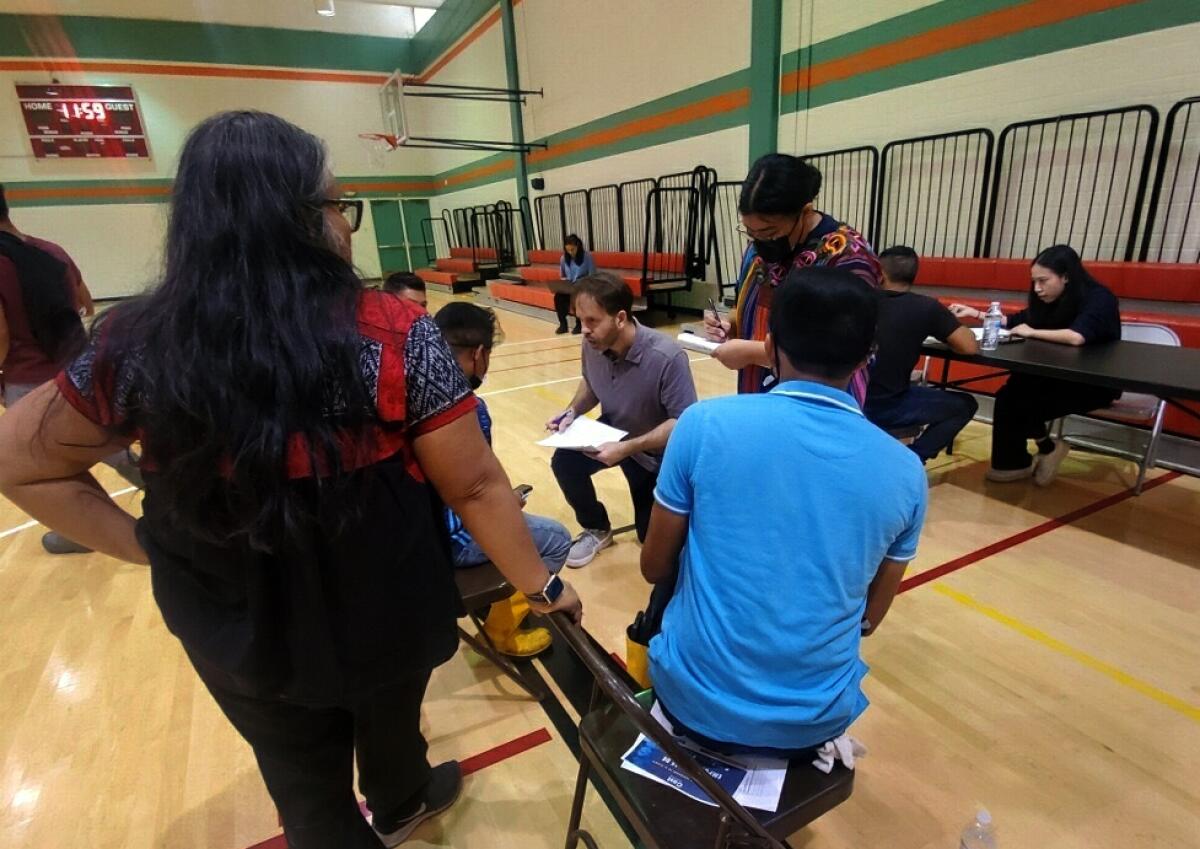
“It should be noted that, as a result of these allegations and this resolution, the Exclusive Poultry has been effectively put out of business, resulting in a loss of economy and jobs to the region that it previously provided for several years,” McClaren said in a statement.
Federal authorities disputed the attorney’s characterization, saying the Labor Department worked with the Exclusive Poultry to ensure it can stay open — but in a manner that complies with labor laws.
“We’re not here to shut anybody down,” Department of Labor attorney Nisha Parekh said. “If an employer responds to our enforcement actions by shutting down, that’s their choice and out of our control.”
When contacted by The Times for comment, a man answered a cellphone registered to Bran and identified himself as his brother, Jhon Bran.
“It’s too bad for him to lose what he loves. The whole thing isn’t even his fault,” Jhon Bran said, adding that he sometimes worked with his brother.
“The chicken business, Tony knows it like the palm of his hand,” the man said. “Twenty-five years doing what he does. He knows something that we don’t know. And he did it pretty good.”
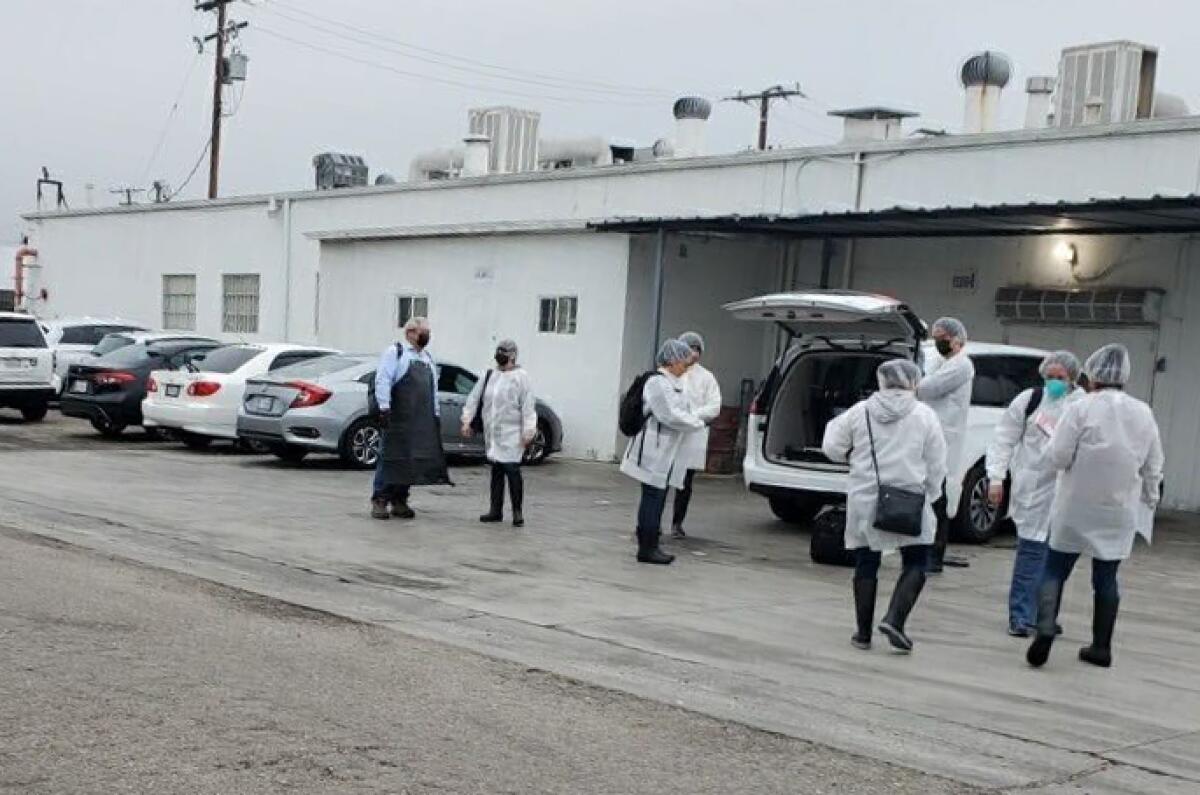
Parekh lauded the workers who came forward against Bran in the federal investigation — especially the children.
“It takes a lot of courage when you’re an underage worker, a migrant worker, and you’ve got a boss who’s threatening you,” Parekh said. “We would love children to know that they can come to us and we will fight for them.”
Several of the companies identified by the Department of Labor as having received poultry products originating from Bran’s facilities have since tried to distance themselves from the case.
Grocery Outlet told The Times that it has never used the Exclusive Poultry or related companies as a supplier. Similarly, a spokesperson for Aldi said the Exclusive Poultry “has never been an Aldi supplier,” adding, “we have stringent processes for identifying vendors and suppliers to ensure all business partners are compliant with all legal and regulatory requirements.”
“Sysco has conducted an internal investigation into this matter and has found no evidence of direct purchases from Exclusive Poultry” or related companies, a spokesperson said in a statement. “Sysco has zero tolerance for child labor, discrimination, or unsafe working conditions for anyone working in our facilities or the facilities of those with whom we do business.”
But Labor investigators found that Grocery Outlet, Aldi and Sysco had all bought poultry from distributors who purchased products from Bran’s companies.
While “it may be correct that they’re not going to the Exclusive and buying this chicken directly,” Parekh said, “they’re kind of fudging it.”
She explained the firm’s role in the supply chain. In short: Bran’s company got the chicken; workers processed it into a particular cut — for example, deboned or deboned and diced; and then the processed chicken was sold to another company, which could either package it and sell it to a grocery store or process the chicken further into things like patties or nuggets.
“From the point where chicken leaves the Exclusive, it could stop two or three or four or five times before it ends up at an Aldi or a Ralphs,” Parekh said.
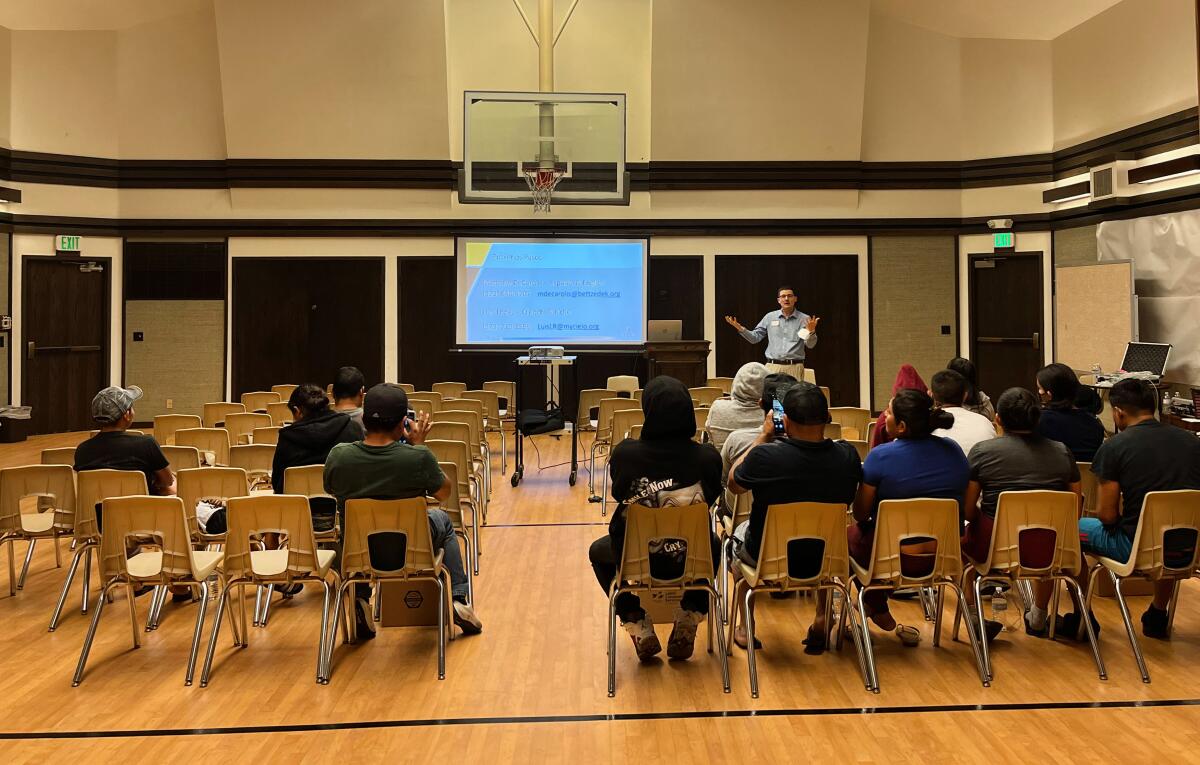
Ralphs, along with Nestle Purina and Royal Canin U.S.A., which also were identified in the federal probe as purchasers of products originating from the Exclusive Poultry, did not respond to requests for comment. Rancho Foods, which was identified as the largest purchaser, also did not respond.
Any products made with child labor or in violation of wage and hour laws are called “hot goods” and can’t be shipped.
“The goods become contraband if they’re made in violation of labor law,” Parekh said. “Any downstream purchaser is potentially liable.”
Last month, one of Bran’s customers, Sterling Pacific Meat Co., sued the Exclusive Poultry for breach of contract, saying it had to “red-tag” 90,000 pounds of “tainted product” it legally couldn’t sell because of the findings of the Labor Department probe.
The company alleged that Bran still sent a bill for more than $180,000. Bran didn’t respond to a request for comment on that case.
In late October, a month after the early-morning raid at the poultry plants, the Thai Community Development Center helped organize another event for workers, this time at a Latter-day Saints church in El Monte, where many of them live. They got legal aid, help signing up for public assistance, personal protective equipment, food boxes from Labor Community Services and attended a workshop on labor rights by Bet Tzedek Legal Services.
Currently, the Labor Department is tracking down workers and calculating how much each is owed. The department hopes to start cutting the first checks in January.
Pedro, the interpreter from CIELO, said the money will make a huge difference in workers’ lives. Many of the Guatemalan employees came from Izabal, Alta Verapaz and Petén, areas where Indigenous people are being pushed out by multinational corporations, according to environmental and human rights groups.
“Having some cushion and some safety net means so much — not just for the workers, but also their family members,” Pedro said. “A lot of us send back money to our families.”
More to Read
Sign up for This Evening's Big Stories
Catch up on the day with the 7 biggest L.A. Times stories in your inbox every weekday evening.
You may occasionally receive promotional content from the Los Angeles Times.
